
The International Trusts Law 69 (I) of 1992 (as amended by Law 20(I)/2012 which came into force on 23/03/2012) and thereafter as amended up to date is not a self-contained statute.
It's rather a law which builds on the existing statutory base, which reflects English Law and practice. The said law provides flexible methodology, with generous practical, fiscal and tax related benefits.
Meaning of Trust
As defined, a trust is a legal mechanism under which "Trustees" - appointed professionals, hold property for the benefit of others - "Equitable" owners known as the "Beneficiaries", effectively creating a flexible method of dealing with the "Settlor's" – creator’s of the Trust, financial affairs while he/she is alive and even later on, in respect to his/her heirs.
The Law defines an international trust as being a trust in respect of which:
- The Settlor (individual or corporate body) must not be a resident of the Republic of Cyprus for the calendar year prior to the incorporation of the International Trust in question (i.e. the Settlor can be resident thereafter - following incorporation). -
- The same principle applies vis-á-vis to Beneficiaries of the International Trust in question (unless the beneficiary is a charity).
- A Protector of the International Trust can and may be formally declared as such in the trust settlement / deed.
- The trust property can now as per latest amendments include any real property (immovables) situated in Cyprus and abroad;
- At all times, there is at least one trustee resident in Cyprus.
- Beneficiaries of the trust, who are residents of the Republic of Cyprus are subject to taxes only in the Republic of Cyprus.
A trust will still qualify as an international trust, even if the settlor or the local trustee or a beneficiary (or any combination of those) is a Cypriot international business company or partnership.
Statutory Aspects:
Any creditors of the Settlor have the legal burden of proving in accordance with the laws of the Republic of Cyprus, that any assets transferred by the Settlor to the International Trust may be subject to legal action, only in case of wilful misconduct and proven attempt of avoidance of personal liability (presumption of legality for the trust's affairs).
The settlor can maintain a share in the assets for the International Trust following incorporation of the same.
There is no time bar / limitation for the duration of the International Trust (used to be 100 years) notwithstanding any statutory provision of Cyprus or any other country to the contrary. The income of an international trust can be accumulated without limitations.
International trusts are exempt from the duty of registration under the provisions of any law and obtain a number and certificate of incorporation by the Cyprus Bar Association. There is, however, stamp duty payable on the creation of the trust paid once at the time of incorporation of the trust.
International Trusts of the Republic of Cyprus that include a choice of applicable law in accordance with Law 69(I)/1992 as amended up to date, cannot be challenged by any other law and the present law is deemed as overriding and binding as a matter of national security / interest.
Tax Aspects:
Section 12 of the International Trusts Law provides that the income and the profits of an international trust derived or deemed to be derived from a source outside Cyprus are completely exempt from income tax or any other tax imposed in Cyprus, such as capital gains or special contribution. The property of the trust is not subject to estate duty. Therefore, trust income, such as royalties, interest, or dividends received from an international business company, is exempt from income tax in the hands of the trustees and the beneficiaries of an international trust also are exempt from payment of income tax in respect of any monies they receive from the trustees.
There is no limitation as to the place and way of investing the International Trust’s assets, provided the investment is effected in a legally sound and prudent way (i.e. there is no limitation in investing in immovables / land, shares etc in the Republic of Cyprus as well as from now on). An International trust is allowed to participate in local business and investments in accordance to the laws and regulations in force for the time being which govern foreign investments in Cyprus. In such a case, all income arising out of local sources will be subject to tax at the normal rates, eg. 12,5% if a Limited Liability Company.
Claims:
The combined effect of these provisions is to render the Cypriot international trust immune, or at least to a large extent immune, from forced heirship and "claw back" rules, especially in those cases where the settlor is domiciled in a civil law jurisdiction e.g. France, Germany etc, which have forced heirship rules applicable on death.
To Sum Up:
Therefore, by creating an international trust as described above, tax liabilities may be greatly and legally reduced, publicity and inconvenience of probate may be avoided, assets may be safeguarded and a solid environment is provided for the Settlor and the Beneficiaries.
Furthermore, the said law prevents trustees, government officials, and officers of the Central Bank of Cyprus from disclosing any information to third parties, unless specifically ordered by a Cypriot court. A Cypriot court should issue an order for disclosure only if the disclosure of information in question, is of paramount importance to the outcome of the case. The Law does not impose any criminal sanctions for improper disclosure, but it does impose a duty on the trustees to take positive action to protect the confidentiality of trust information, in a way similar to general trust principles.
Charis Papademetriou
PAPADEMETRIOU & PARTNERS LTD
cpappan@cytanet.com.cy
